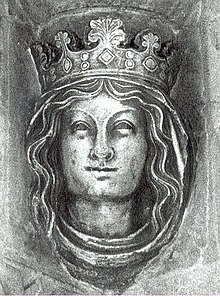 Queen Eleanor of Provence | |
| Pronunciation | /ˈɛlənər, -nɔːr/ |
|---|---|
| Gender | Female |
| Language(s) | French and English |
| Origin | |
| Region of origin | Southern France |
| Other names | |
| Variant form(s) | Eleonore, Eleanora, Eleonora, Eléonore, Elanor, Elinor (see Variants section) |
| Nickname(s) | Nora, Ella, Ellie, Elle, El, Nell, Nellie, Nelly |
Eleanor (/ˈɛlənər, -nɔːr/) is a feminine given name, originally from an Old French adaptation of the Old Provençal name Aliénor. It was the name of a number of women of royalty and nobility in western Europe during the High Middle Ages. The name was introduced to England by Eleanor of Aquitaine, who came to marry King Henry II. It was also borne by Eleanor of Provence, who became queen consort of England as the wife of King Henry III, and Eleanor of Castile, wife of Edward I.
The name was popular in the United States in the 1910s and 1920s, peaking at rank 25 in 1920. It declined below 600 by the 1970s but has again risen in popularity. It ranked 32nd in the 2010s. It ranked 16th on the popularity chart for names given to newborn girls in the United States in 2022.[1] Eleanor Roosevelt, the longest-serving first lady of the U.S., was probably the most famous bearer of the name in contemporary history. A common variant is Eleonora/Eleanora. In 2022, it was the 43rd most popular name given to girls in Canada.[2]
Common hypocorisms include Elle, Ella, Ellie, Elly, Leonor, Leonora, Leonore, Nella, Nellie, Nelly, and Nora.
- ^ behindthename.com (US statistics)
- ^ "Table 17-10-0147-01 First names at birth by sex at birth, selected indicators (Number)". Statistics Canada. Retrieved 2024-08-25.